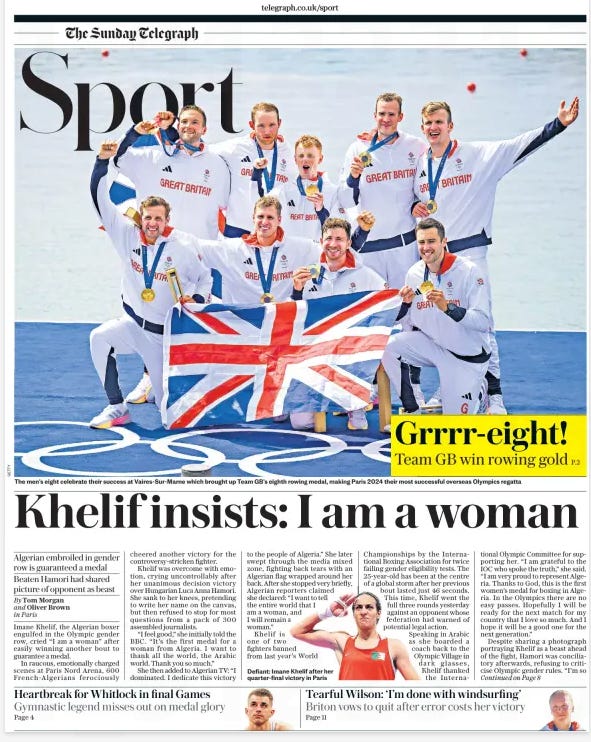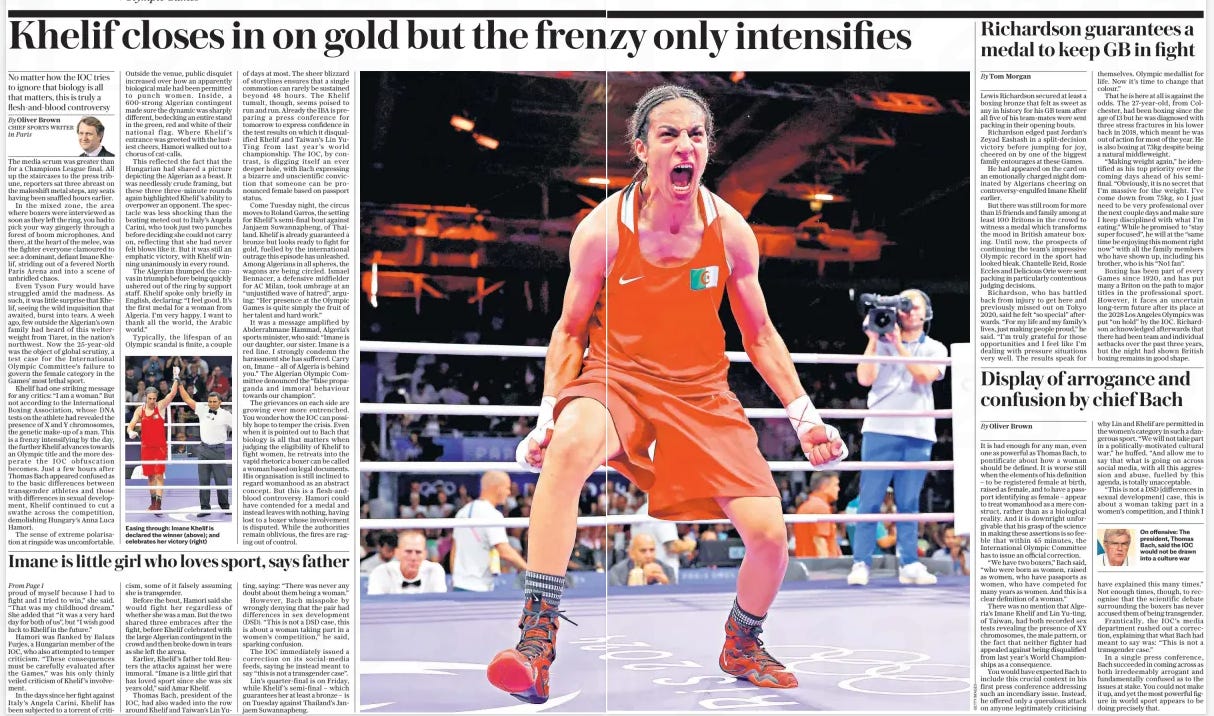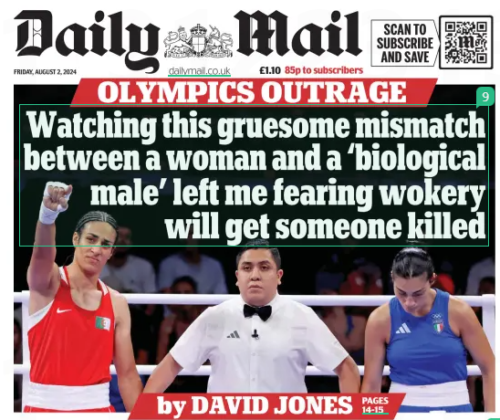The Trans Agenda
[4 August 2024]
After what could be deemed a few relatively quiet months, give or take, the papers are back with all the pent up aggression of Tommy Robinson fan who’s found the coke stash. This week, trans people have taken a pummelling, mostly from people shouting IT’S NOT ABOUT TRANS PEOPLE.
If it wasn’t for the manufactured outrage around Imane Khelif and Lin Yu-Ting, I would be reporting that there were just 10 articles this week. Alas, that is not what I am reporting. There have been 48 featuring Khelif/Yu-Ting/gender/trans people.
That’s the worst week since the week ending 21 May.
Although trans people do not feature in this story, the boxing attacks are absolutely being used as a way to attack trans people and, of course, those who do not fit the narrow definition of white cis femininity.
Sean Ingle was of course at it again in the Guardian, although he was quickly moved on to other stories. Remember, Ingle believes that cave men could throw spears better than cave women and that’s why trans women shouldn’t play in women’s sports.
Sonia Sodha also returned with her one column where as she tries to demonstrate that she knows more than all the doctors in the UK by advocating harm in the name of ‘do no harm’.
Ella Whelan in The Telegraph calls the ‘militant BMA’ an ‘enemy of the people’ while Suzanne Moore said of the ‘disgusting’ woman who was born a girl, raised as a girl and has existed in the world all her life as female, that she has the ‘characteristics of a biological male’. Her qualifications to make this claim? She read it on the internet.
In short, they were all back to their batshit worst. The Telegraph alone published 17 articles in the final three days of the week while Friday saw the most across all publications with 15. Bear in mind, last week saw 22 in total across four publications and seven days.
And it had all started out so quietly…
You can subscribe to The Trans Agenda here.
THE PAPERS Monday 29th July – Sunday 4th August 2024
Monday Total: 0
The Guardian [0]
The Times [0]
Daily Mail [0]
Telegraph [0]
Tuesday Total: 8
The Guardian [2]
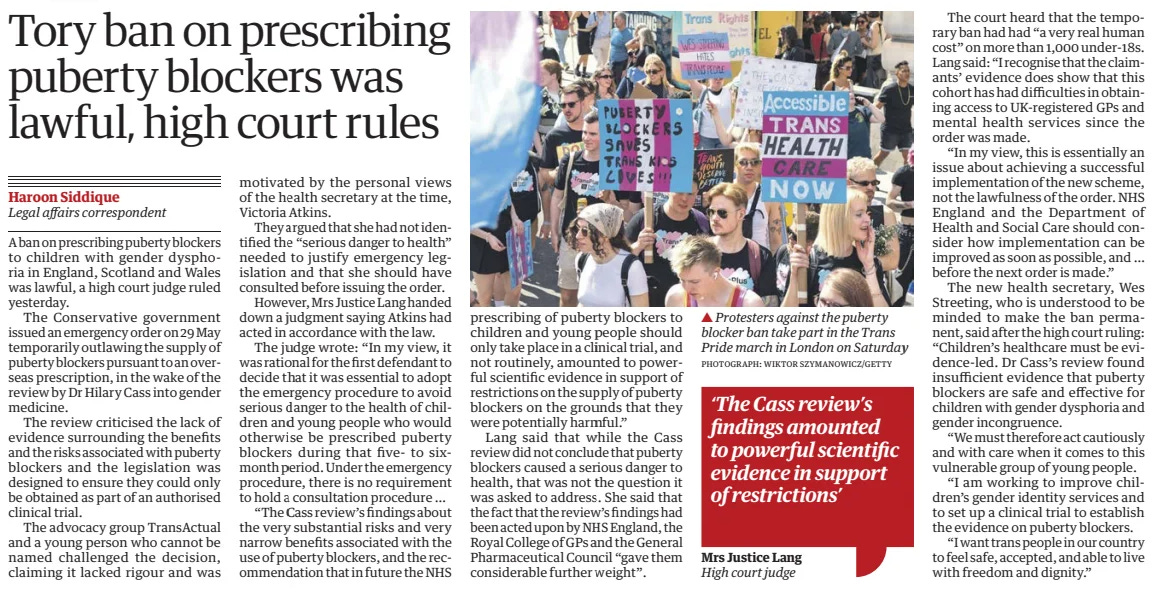
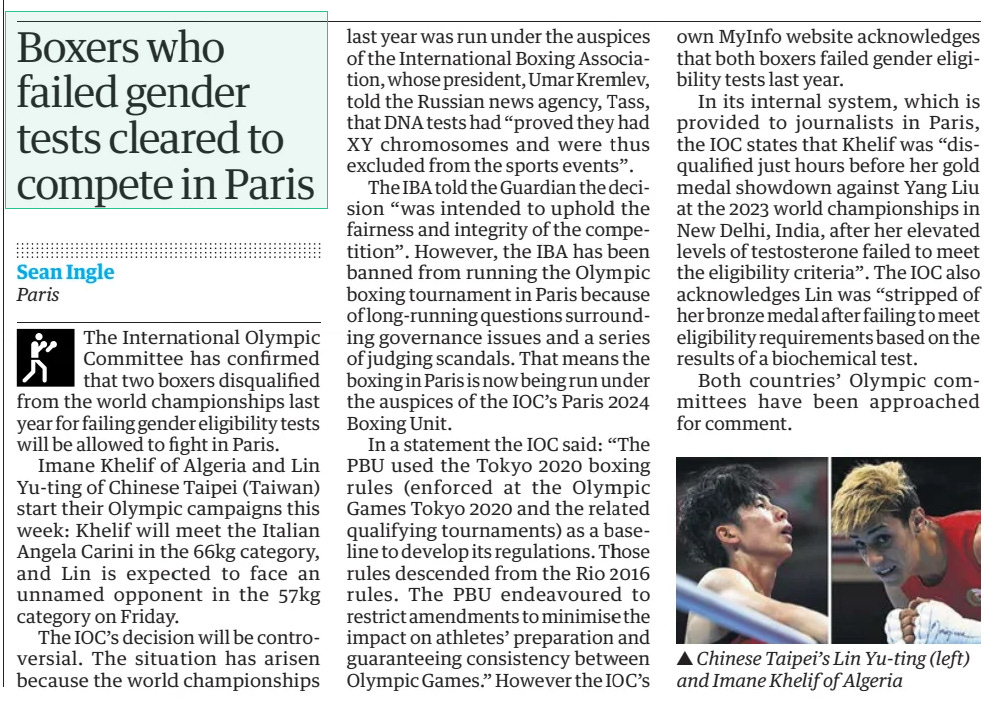
The Times [1]
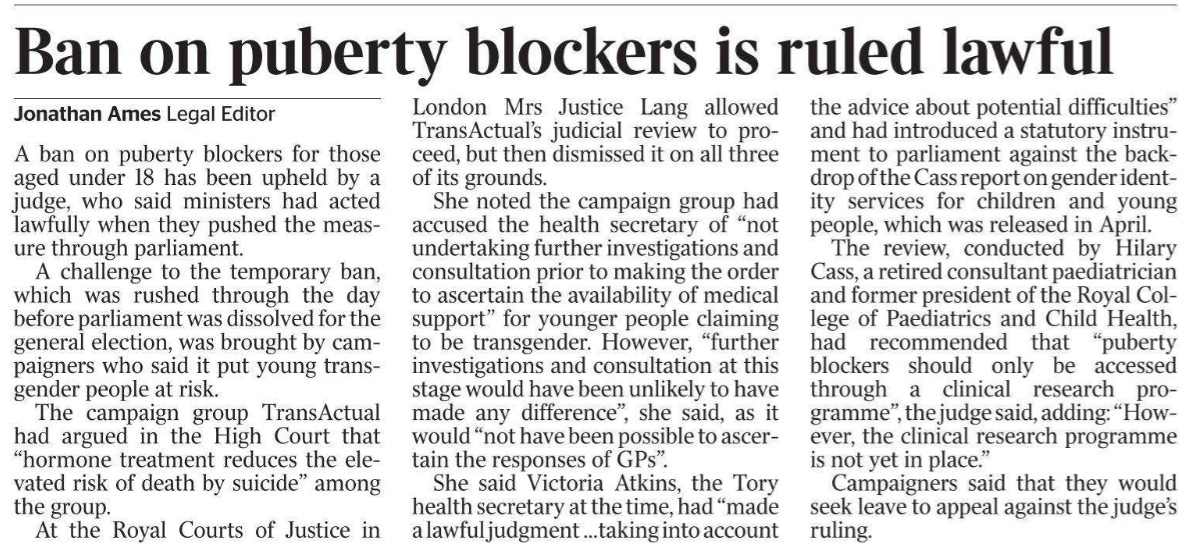
Daily Mail [2]
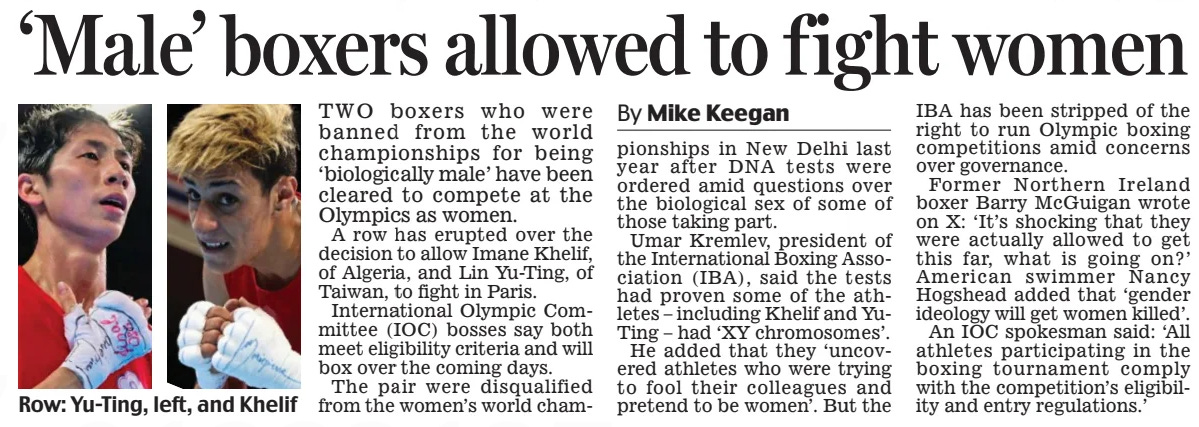
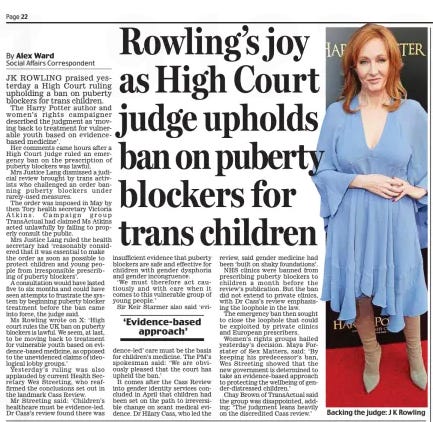
Telegraph [3]

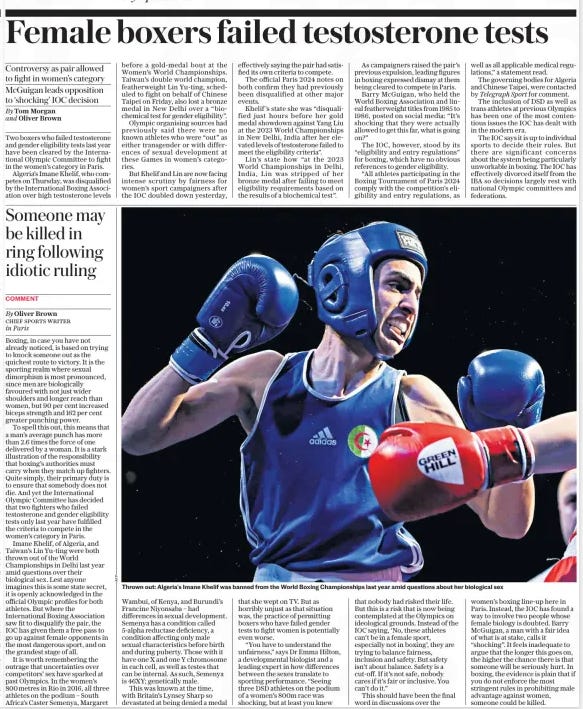
Wednesday Total: 0
The Guardian [0]
The Times [0]
Daily Mail [0]
Telegraph [0]
Thursday Total: 4
The Guardian [0]
The Times [2]
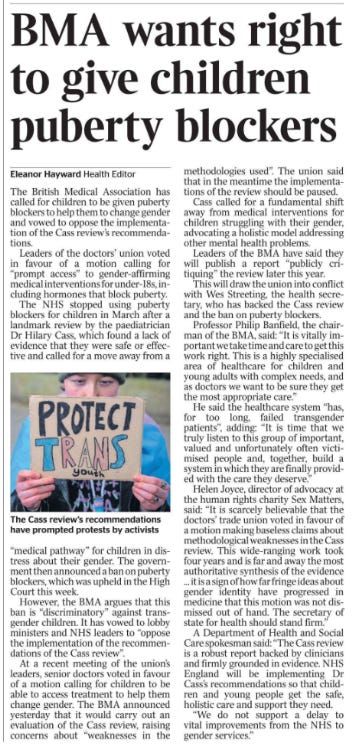
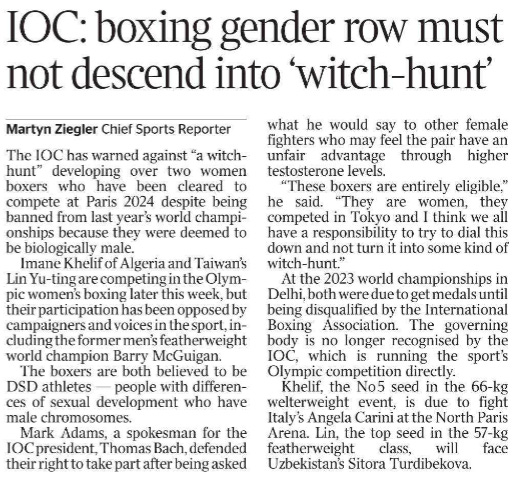
Daily Mail [1]

Telegraph [1]

Friday Total: 15
The Guardian [2]
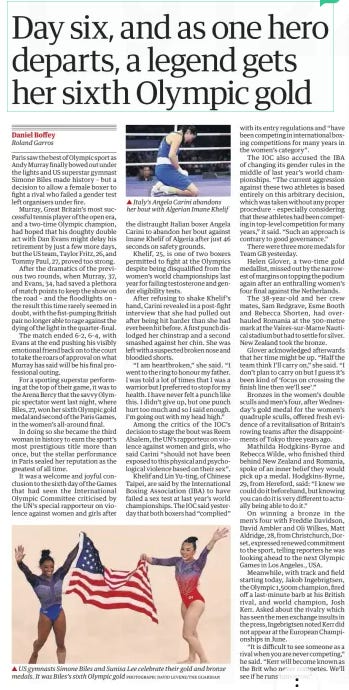


The Times [2]
![Gloves are off in boxing gender row Female Olympian quits bout with rival who failed testosterone test, report David Brown and Matt Lawton Imane Khelif of Algeria, in red, left Angela Carini of Italy, who trains with her brother and has always fought against male opponents, sobbing in the ring. Next image › The Olympic Games organisers have been criticised for allowing an Algerian boxer who failed a gender test last year to batter her female opponent into submission in 46 seconds yesterday. Imane Khelif, 25, was declared the winner after the Italian fighter Angela Carini, also 25, withdrew after a few punches, saying it was to “save my life”. A human rights group said the rules on gender eligibility for the women’s boxing tournament at Paris had created a “dangerous and absurd spectacle”. The International Olympic Committee’s [IOC] profile of Khelif records that she was disqualified hours before her gold medal match at last year’s world championships “after her elevated levels of testosterone failed to meet the eligibility criteria”. Giorgia Meloni, the Italian prime minister, said: “Athletes who have male genetic characteristics should not be admitted to women’s competitions. And not because you want to discriminate, but to protect the right of female athletes to be able to compete on equal terms. It was not an even contest.” She posted a photo of herself consoling Carini, a police officer. “I know that one day you will get what you deserve through strength and sweat. In a competition that is finally equal,” Meloni wrote. Carini fell to her knees and sobbed after the 66kg bout was abandoned then shrugged off Khelif’s attempts to shake her hand. She had a nose injury and blood on her trunks. “I am heartbroken because I am a fighter,” Carini said. “I have always stepped into the ring with honour ... And this time I couldn’t do it because I couldn’t fight any more. In that moment, I had to safeguard my life. I train with my brother. I’ve always fought against men, but I felt too much pain today. It hurt so much. I am heartbroken. I have never felt a punch like this. After the second blow, I felt extreme pain ... I didn’t lose, I just surrendered with maturity.” Khelif said: “I hope to achieve a second victory to secure a medal, and then think about the gold medal. I tell the Algerian people that I am working to provide the best I can in order to make them happy.” JK Rowling, the author and campaigner, addressed a message to Kirsty Burrows, head of the International Olympic Committee’s safe sport unit: “A young female boxer has just had everything she’s worked and trained for snatched away because you allowed a male to get in the ring with her. You’re a disgrace, your ‘safeguarding’ is a joke and #Paris24 will be for ever tarnished by the brutal injustice done to Carini.” Khelif was one of two boxers cleared to compete in Paris despite having been disqualified from last year’s World Championships, which is run by the International Boxing Association. The other is Lin Yu Ting, 28, of Taiwan. Umar Kremlev, president of the association, said DNA tests showed the boxers had “XY chromosomes and were thus excluded”. It issued a statement on Wednesday in which it claimed that neither boxer had a “testosterone examination” last year but they were “subject to a separate and recognised test” for their disqualification. Khelif dropped an appeal. The Algerian Olympic Committee claimed the disqualification was a conspiracy to stop them winning gold, citing “medical reasons” for high testosterone levels. The International Olympic Committee no longer recognises the IBA because of its links with Russia, so is running the boxing in Paris itself. It operates different eligibility criteria for women. A spokesman said Khelif and Lin were “women according to their passports”. Some experts suggest the two have “differences of sexual development”, a group of rare conditions that can lead to increased testosterone and muscle mass as well as a skeletal advantage. Gloves are off in boxing gender row Female Olympian quits bout with rival who failed testosterone test, report David Brown and Matt Lawton Imane Khelif of Algeria, in red, left Angela Carini of Italy, who trains with her brother and has always fought against male opponents, sobbing in the ring. Next image › The Olympic Games organisers have been criticised for allowing an Algerian boxer who failed a gender test last year to batter her female opponent into submission in 46 seconds yesterday. Imane Khelif, 25, was declared the winner after the Italian fighter Angela Carini, also 25, withdrew after a few punches, saying it was to “save my life”. A human rights group said the rules on gender eligibility for the women’s boxing tournament at Paris had created a “dangerous and absurd spectacle”. The International Olympic Committee’s [IOC] profile of Khelif records that she was disqualified hours before her gold medal match at last year’s world championships “after her elevated levels of testosterone failed to meet the eligibility criteria”. Giorgia Meloni, the Italian prime minister, said: “Athletes who have male genetic characteristics should not be admitted to women’s competitions. And not because you want to discriminate, but to protect the right of female athletes to be able to compete on equal terms. It was not an even contest.” She posted a photo of herself consoling Carini, a police officer. “I know that one day you will get what you deserve through strength and sweat. In a competition that is finally equal,” Meloni wrote. Carini fell to her knees and sobbed after the 66kg bout was abandoned then shrugged off Khelif’s attempts to shake her hand. She had a nose injury and blood on her trunks. “I am heartbroken because I am a fighter,” Carini said. “I have always stepped into the ring with honour ... And this time I couldn’t do it because I couldn’t fight any more. In that moment, I had to safeguard my life. I train with my brother. I’ve always fought against men, but I felt too much pain today. It hurt so much. I am heartbroken. I have never felt a punch like this. After the second blow, I felt extreme pain ... I didn’t lose, I just surrendered with maturity.” Khelif said: “I hope to achieve a second victory to secure a medal, and then think about the gold medal. I tell the Algerian people that I am working to provide the best I can in order to make them happy.” JK Rowling, the author and campaigner, addressed a message to Kirsty Burrows, head of the International Olympic Committee’s safe sport unit: “A young female boxer has just had everything she’s worked and trained for snatched away because you allowed a male to get in the ring with her. You’re a disgrace, your ‘safeguarding’ is a joke and #Paris24 will be for ever tarnished by the brutal injustice done to Carini.” Khelif was one of two boxers cleared to compete in Paris despite having been disqualified from last year’s World Championships, which is run by the International Boxing Association. The other is Lin Yu Ting, 28, of Taiwan. Umar Kremlev, president of the association, said DNA tests showed the boxers had “XY chromosomes and were thus excluded”. It issued a statement on Wednesday in which it claimed that neither boxer had a “testosterone examination” last year but they were “subject to a separate and recognised test” for their disqualification. Khelif dropped an appeal. The Algerian Olympic Committee claimed the disqualification was a conspiracy to stop them winning gold, citing “medical reasons” for high testosterone levels. The International Olympic Committee no longer recognises the IBA because of its links with Russia, so is running the boxing in Paris itself. It operates different eligibility criteria for women. A spokesman said Khelif and Lin were “women according to their passports”. Some experts suggest the two have “differences of sexual development”, a group of rare conditions that can lead to increased testosterone and muscle mass as well as a skeletal advantage.](https://substackcdn.com/image/fetch/w_1456,c_limit,f_auto,q_auto:good,fl_progressive:steep/https%3A%2F%2Fsubstack-post-media.s3.amazonaws.com%2Fpublic%2Fimages%2Fc319925a-3146-40c8-b1ab-08f305809a82_656x534.png)
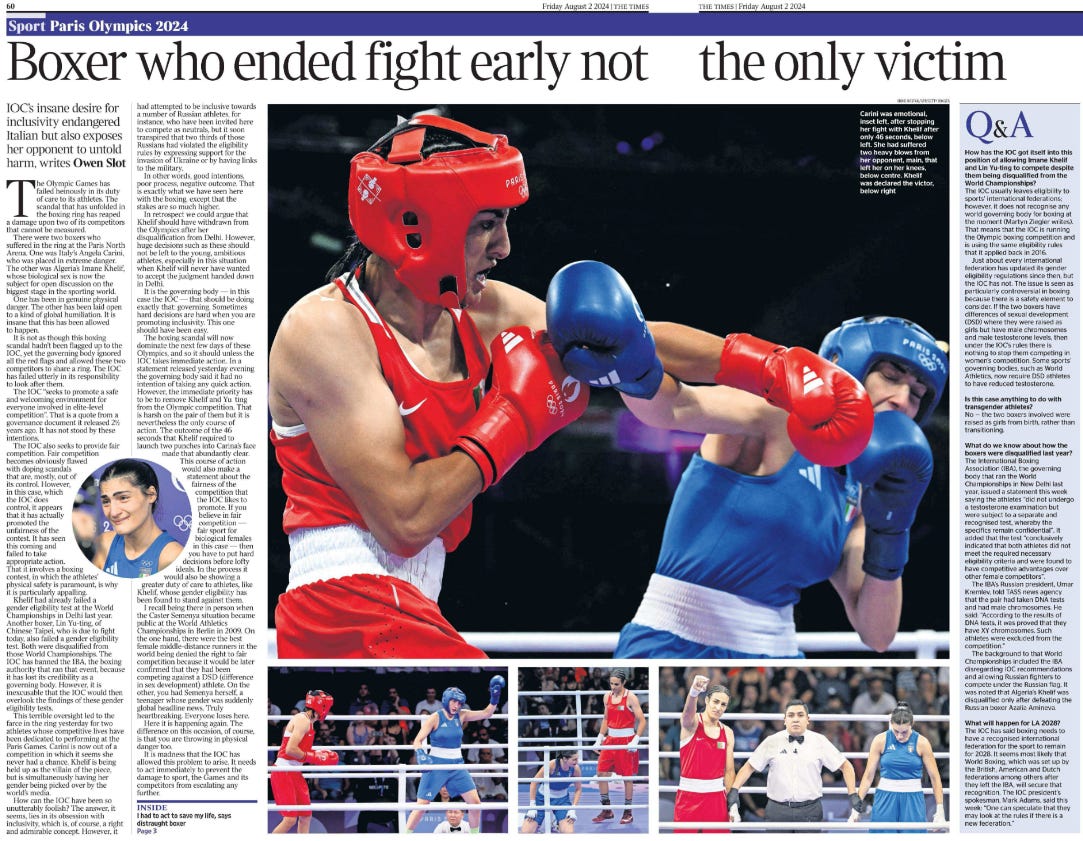
Daily Mail [4]
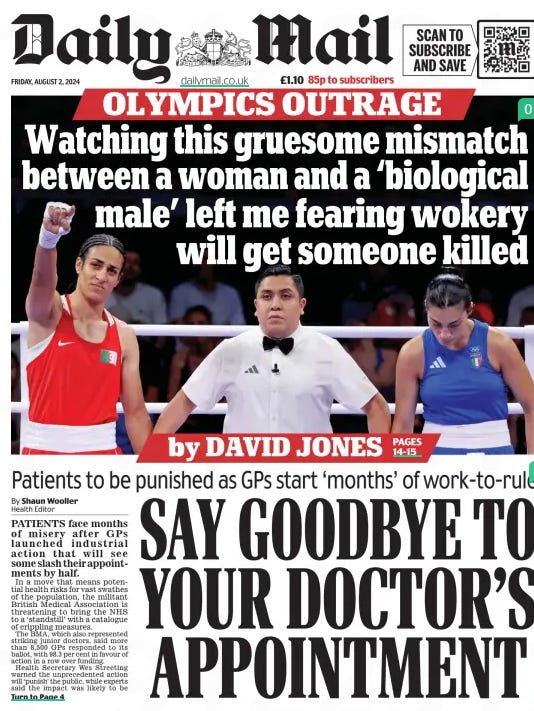
![DAVID JONES AT THE RINGSIDE JK fury over boxing match that forced woman to quit against ‘male’ opponent af ter just 46 seconds Daily Mail2 Aug 2024From Sam Greenhill and Claire Duffin in Paris A FEMALE boxer once disqualified for being ‘biologically male’ yesterday forced out an Italian opponent in one of the most controversial Olympic moments ever. A global backlash, led by Italy’s prime minister and Harry Potter author JK Rowling, ensued after Angela Carini quit to ‘save my life’ just 46 seconds into her bout against Algerian opponent Imane Khelif, claiming she had been hit so hard that she ‘couldn’t breathe’. Giorgia Meloni protested after her nation’s Olympic hopeful was left sobbing on her knees in the ring following the contentious match against a rival previously banned for having an ‘unfair advantage’. Ms Meloni added: ‘I was emotional yesterday when she wrote “I will fight” because the dedication, the head, the character, surely also play a role in these things. But then it also matters to be able to compete on equal grounds and, from my point of view, it was not an even contest.’ The Italian premier was joined by Ms Rowling, former British PM Liz Truss and Sir Andy Murray’s mother, Judy, as well as female sports stars, in condemning the scenes. The fight between the two 25year-olds ended after Carini was rocked by two punches and said later the savage force of the blows had made it ‘impossible to continue’. Carini, a police officer, fell to her knees and burst into tears as she conceded the match, shouting: ‘This is unjust.’ Her prime minister, who was visiting the Olympic Village yesterday, said: ‘This, from my point of view, was not a competition on equal terms. It is a fact that with the levels of testosterone present in the blood of the Algerian athlete the race at the start does not seem fair.’ Women’s rights campaigner Ms Rowling tweeted a video of the fight and wrote: ‘Watch this then explain why you’re OK with a man beating a woman in public for your entertainment. This isn’t sport. From the bullying cheat in red all the way up to the organisers who allowed this to happen, this is men revelling in their power over women.’ Carini was pictured in floods of tears after the match and said she was unable to continue for her health, adding: ‘I have never felt a punch like this.’ Ms Murray wrote on X: ‘This should never have been allowed to happen.’ James Guy, a five-times Olympic medallist member of the British swimming team tweeted: ‘Not fair!’, while former GB swimmer Sharron Davies said: ‘This is a biological male fighting a female & absolutely everyone can see it.’ Former tennis star Martina Navratilova wrote it was ‘a travesty and makes a mockery of all Olympic sports’. Speaking out after her loss, Carini explained: ‘It could be the match of my life but, in that moment, I had to safeguard my life, too.’ After the match was stopped, the referee raised Khelif’s hand in the air. But a visibly furious Carini yanked her own hand away from the fight official and walked off. Carini’s coach Emanuele Renzini reportedly said after the fight: ‘I don’t know if her nose is broken. But many people in Italy tried to call and tell her: “Don’t go please: It’s a man, it’s dangerous for you”.’ The United Nations’ Special Rapporteur on violence against women and girls, Reem Alsalem, backed Carini saying she ‘rightly followed her instincts and prioritised her physical safety, but she and other female athletes should not have been exposed to this physical and psychological violence based on their sex.’ And Labour MP and feminist campaigner Rosie Duffield told the Mail: ‘For days, we have been highlighting the potential danger of this specific event to the IOC [International Olympic Committee] who chose to go ahead and ignore us.’ Former Prime Minister Liz Truss also said: ‘When will this madness stop?’ However, Labour’s two equalities ministers were, despite requests for comment, both silent. As the furore was raging, one of them, Anneliese Dodds did find time to tweet about ‘cycling to work day’. But Khelif was backed by her country’s Olympic committee which ‘strongly condemns the unethical targeting and maligning of our esteemed athlete’. The IOC said all boxers in Paris ‘comply with the competition’s eligibility and entry regulations’. Khelif was allowed to fight at the Olympics despite being disqualified from the women’s world championships last year for failing testosterone and gender eligibility tests. These were organised by the International Boxing Association (IBA), a Russia-led body which has since been stripped of its status. But ex-world champion Amy Broadhurst tweeted: ‘Personally I don’t think she has done anything to “cheat”. I thinks it’s the way she was born & that’s out of her control.’ The IOC blamed the IBA’s ‘arbirary’ decision for the row, with a spokesman adding: ‘This is not a transgender issue. I should make this absolutely clear.’ ‘Hit so hard I couldn’t breathe’ Article Name:DAVID JONES AT THE RINGSIDE JK fury over boxing match that forced woman to quit against ‘male’ opponent af ter just 46 seconds Publication:Daily Mail Author:From Sam Greenhill and Claire Duffin in Paris Start Page:13 End Page:13 DAVID JONES AT THE RINGSIDE JK fury over boxing match that forced woman to quit against ‘male’ opponent af ter just 46 seconds Daily Mail2 Aug 2024From Sam Greenhill and Claire Duffin in Paris A FEMALE boxer once disqualified for being ‘biologically male’ yesterday forced out an Italian opponent in one of the most controversial Olympic moments ever. A global backlash, led by Italy’s prime minister and Harry Potter author JK Rowling, ensued after Angela Carini quit to ‘save my life’ just 46 seconds into her bout against Algerian opponent Imane Khelif, claiming she had been hit so hard that she ‘couldn’t breathe’. Giorgia Meloni protested after her nation’s Olympic hopeful was left sobbing on her knees in the ring following the contentious match against a rival previously banned for having an ‘unfair advantage’. Ms Meloni added: ‘I was emotional yesterday when she wrote “I will fight” because the dedication, the head, the character, surely also play a role in these things. But then it also matters to be able to compete on equal grounds and, from my point of view, it was not an even contest.’ The Italian premier was joined by Ms Rowling, former British PM Liz Truss and Sir Andy Murray’s mother, Judy, as well as female sports stars, in condemning the scenes. The fight between the two 25year-olds ended after Carini was rocked by two punches and said later the savage force of the blows had made it ‘impossible to continue’. Carini, a police officer, fell to her knees and burst into tears as she conceded the match, shouting: ‘This is unjust.’ Her prime minister, who was visiting the Olympic Village yesterday, said: ‘This, from my point of view, was not a competition on equal terms. It is a fact that with the levels of testosterone present in the blood of the Algerian athlete the race at the start does not seem fair.’ Women’s rights campaigner Ms Rowling tweeted a video of the fight and wrote: ‘Watch this then explain why you’re OK with a man beating a woman in public for your entertainment. This isn’t sport. From the bullying cheat in red all the way up to the organisers who allowed this to happen, this is men revelling in their power over women.’ Carini was pictured in floods of tears after the match and said she was unable to continue for her health, adding: ‘I have never felt a punch like this.’ Ms Murray wrote on X: ‘This should never have been allowed to happen.’ James Guy, a five-times Olympic medallist member of the British swimming team tweeted: ‘Not fair!’, while former GB swimmer Sharron Davies said: ‘This is a biological male fighting a female & absolutely everyone can see it.’ Former tennis star Martina Navratilova wrote it was ‘a travesty and makes a mockery of all Olympic sports’. Speaking out after her loss, Carini explained: ‘It could be the match of my life but, in that moment, I had to safeguard my life, too.’ After the match was stopped, the referee raised Khelif’s hand in the air. But a visibly furious Carini yanked her own hand away from the fight official and walked off. Carini’s coach Emanuele Renzini reportedly said after the fight: ‘I don’t know if her nose is broken. But many people in Italy tried to call and tell her: “Don’t go please: It’s a man, it’s dangerous for you”.’ The United Nations’ Special Rapporteur on violence against women and girls, Reem Alsalem, backed Carini saying she ‘rightly followed her instincts and prioritised her physical safety, but she and other female athletes should not have been exposed to this physical and psychological violence based on their sex.’ And Labour MP and feminist campaigner Rosie Duffield told the Mail: ‘For days, we have been highlighting the potential danger of this specific event to the IOC [International Olympic Committee] who chose to go ahead and ignore us.’ Former Prime Minister Liz Truss also said: ‘When will this madness stop?’ However, Labour’s two equalities ministers were, despite requests for comment, both silent. As the furore was raging, one of them, Anneliese Dodds did find time to tweet about ‘cycling to work day’. But Khelif was backed by her country’s Olympic committee which ‘strongly condemns the unethical targeting and maligning of our esteemed athlete’. The IOC said all boxers in Paris ‘comply with the competition’s eligibility and entry regulations’. Khelif was allowed to fight at the Olympics despite being disqualified from the women’s world championships last year for failing testosterone and gender eligibility tests. These were organised by the International Boxing Association (IBA), a Russia-led body which has since been stripped of its status. But ex-world champion Amy Broadhurst tweeted: ‘Personally I don’t think she has done anything to “cheat”. I thinks it’s the way she was born & that’s out of her control.’ The IOC blamed the IBA’s ‘arbirary’ decision for the row, with a spokesman adding: ‘This is not a transgender issue. I should make this absolutely clear.’ ‘Hit so hard I couldn’t breathe’ Article Name:DAVID JONES AT THE RINGSIDE JK fury over boxing match that forced woman to quit against ‘male’ opponent af ter just 46 seconds Publication:Daily Mail Author:From Sam Greenhill and Claire Duffin in Paris Start Page:13 End Page:13](https://substackcdn.com/image/fetch/w_1456,c_limit,f_auto,q_auto:good,fl_progressive:steep/https%3A%2F%2Fsubstack-post-media.s3.amazonaws.com%2Fpublic%2Fimages%2F5834b73a-3ec1-4e36-a3ec-f8fcda396125_542x543.png)
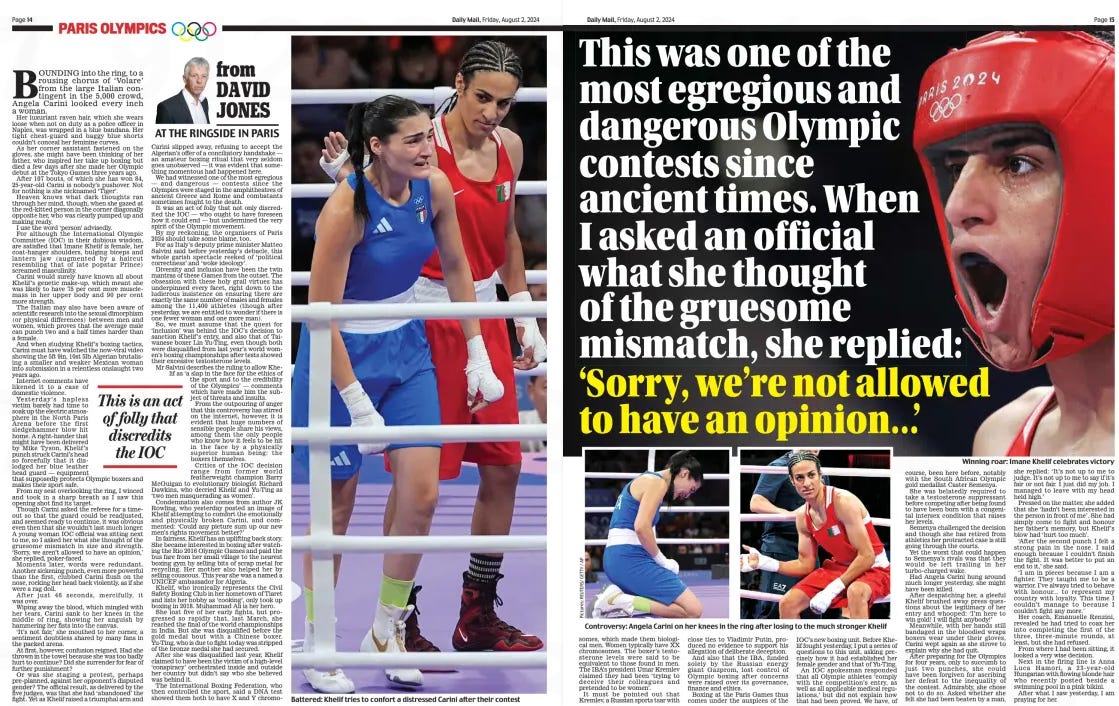
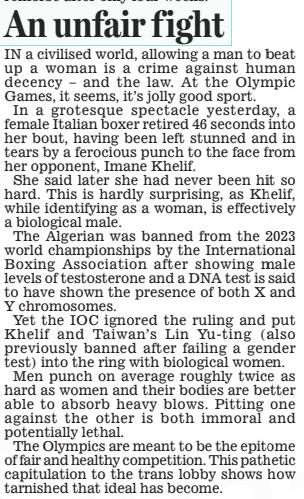
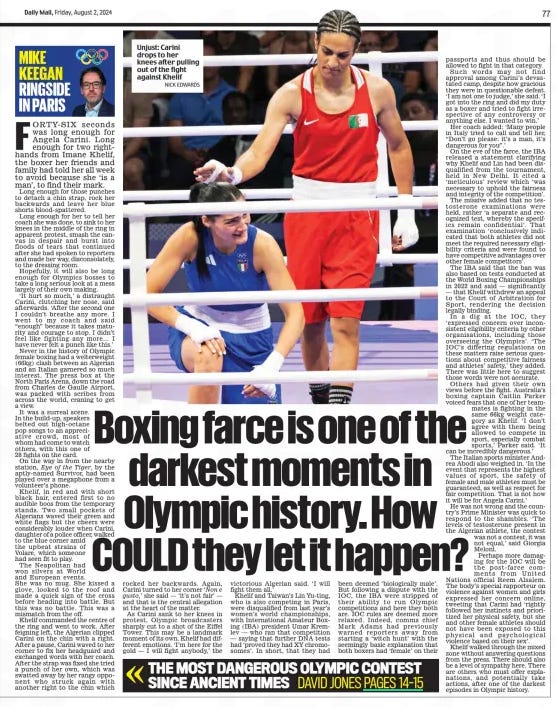
Telegraph [7]
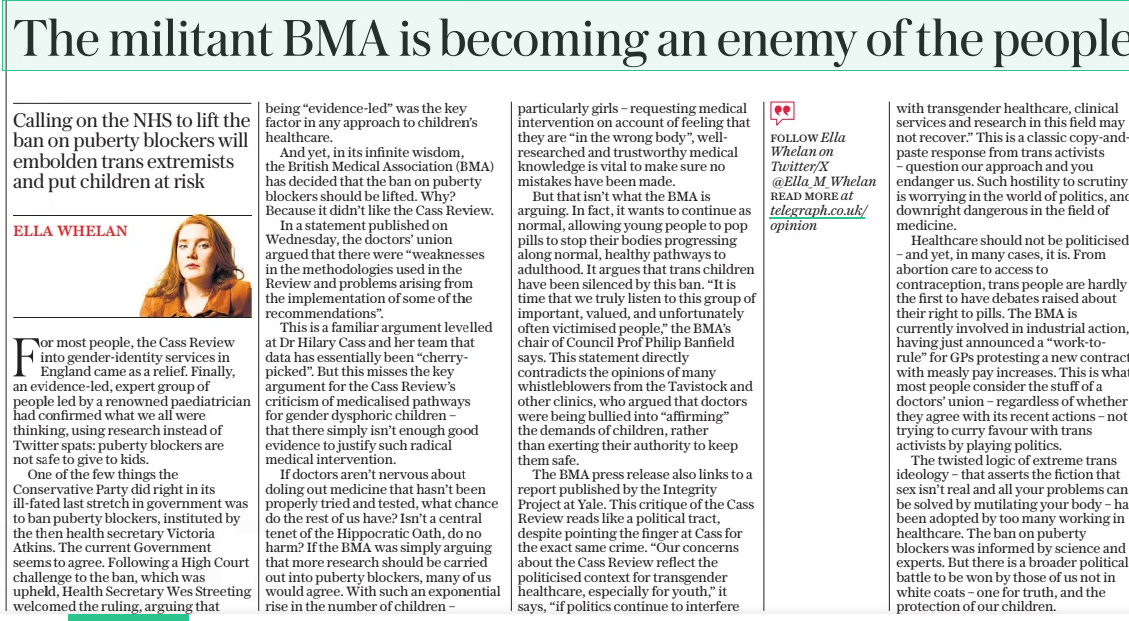
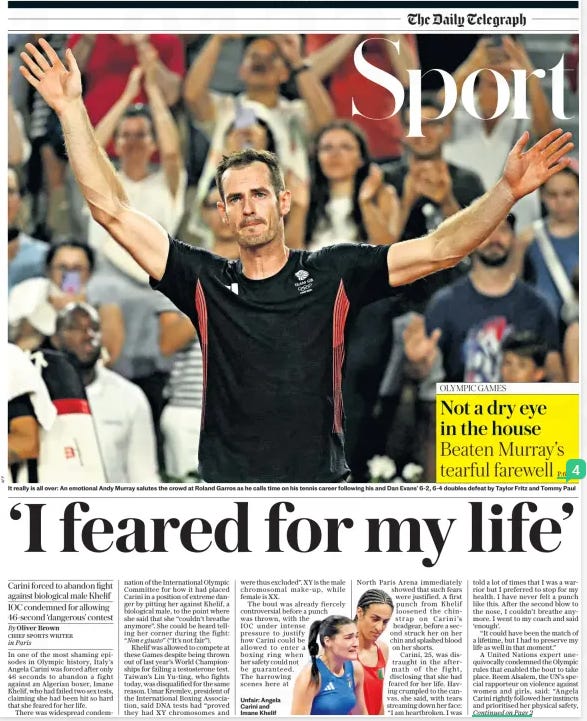
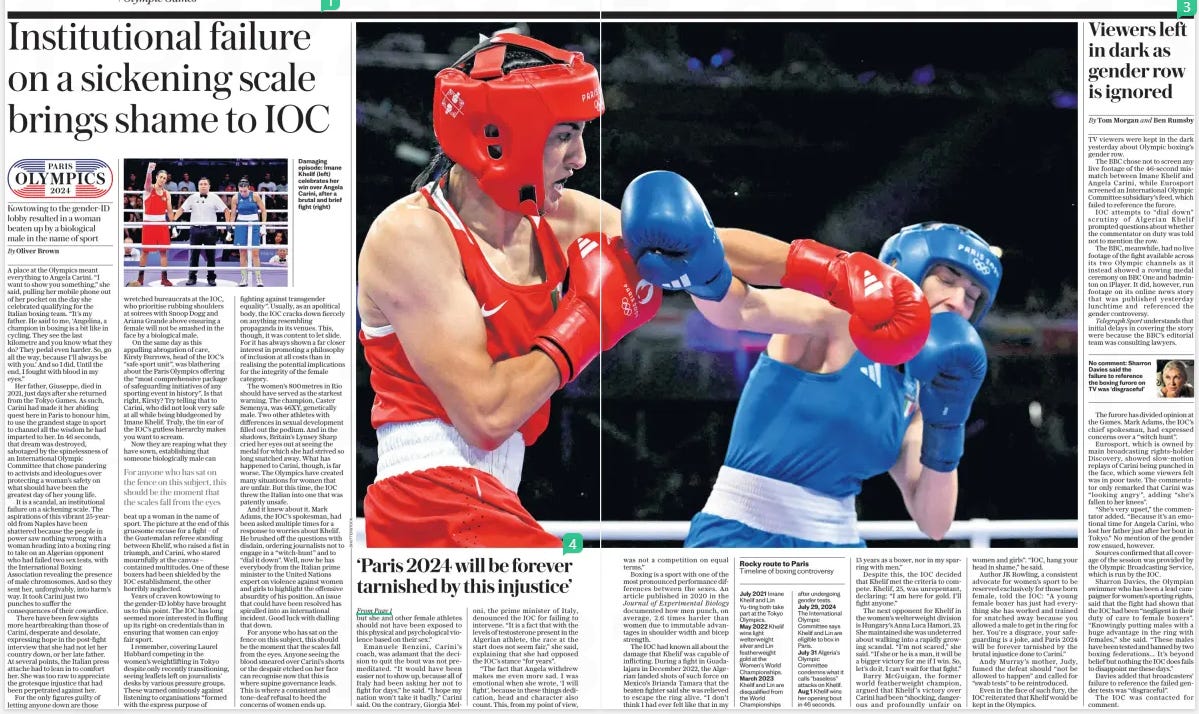
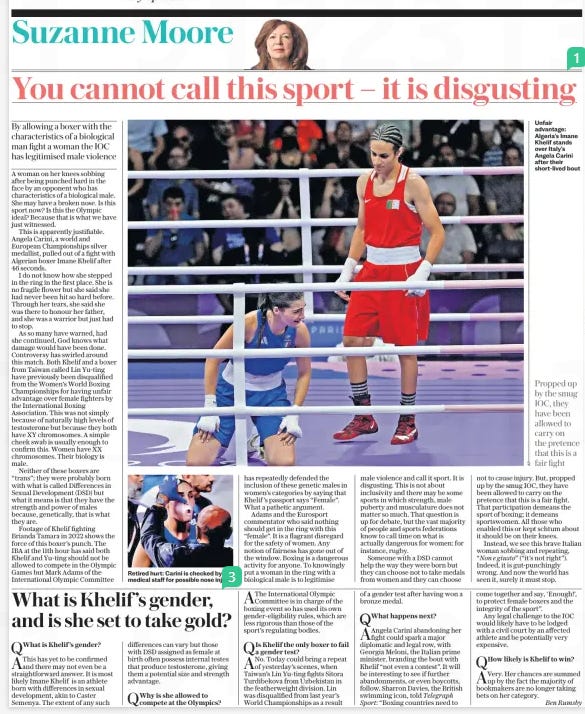
Saturday Total: 11
The Guardian [2]
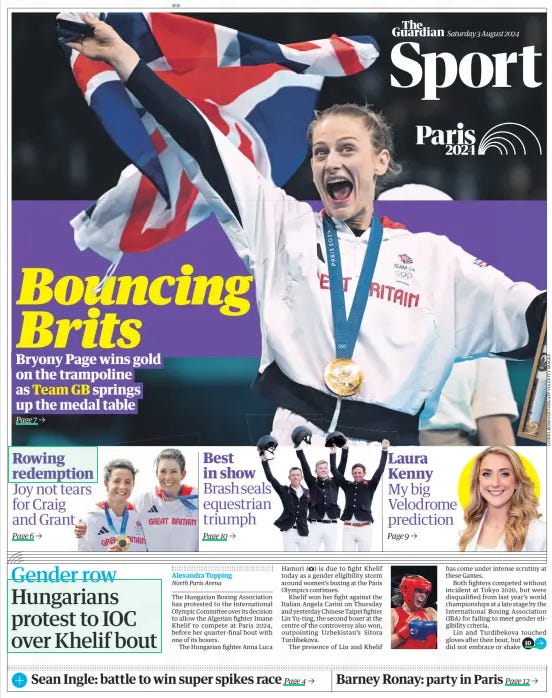
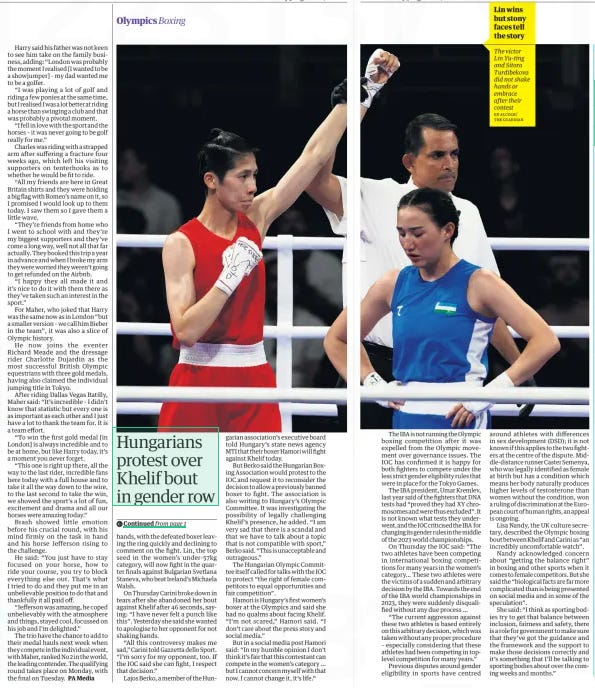
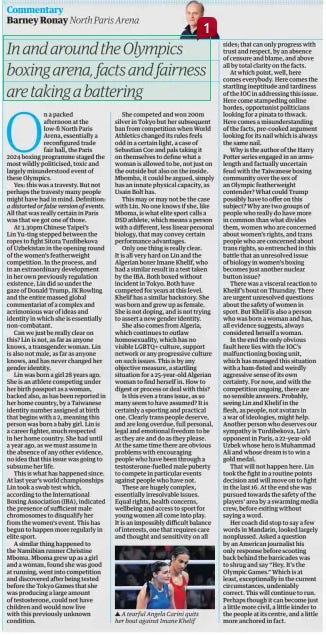
The Times [2]

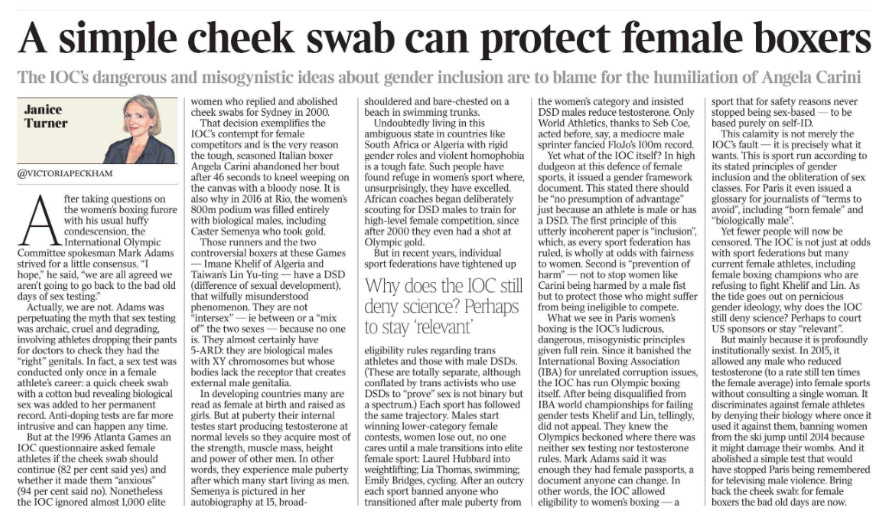
Daily Mail [2]
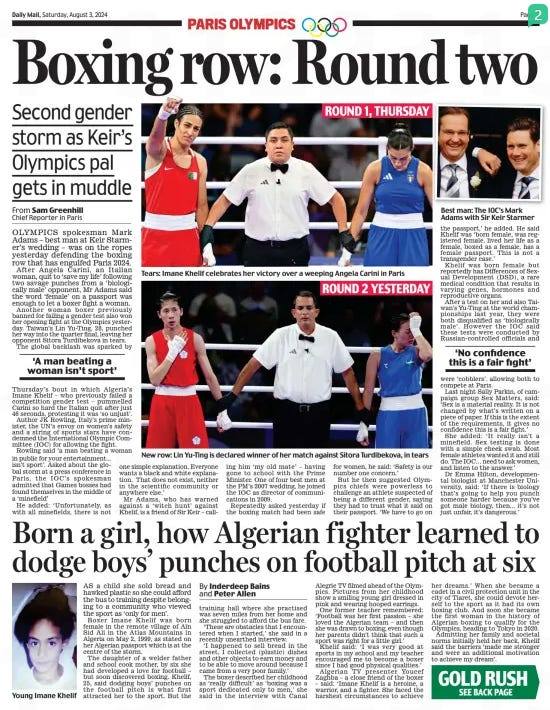
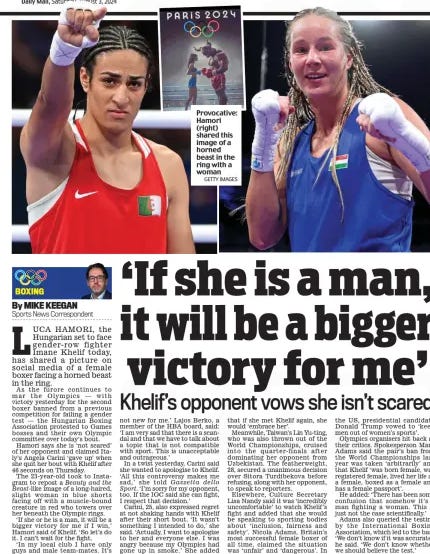
Telegraph [5]
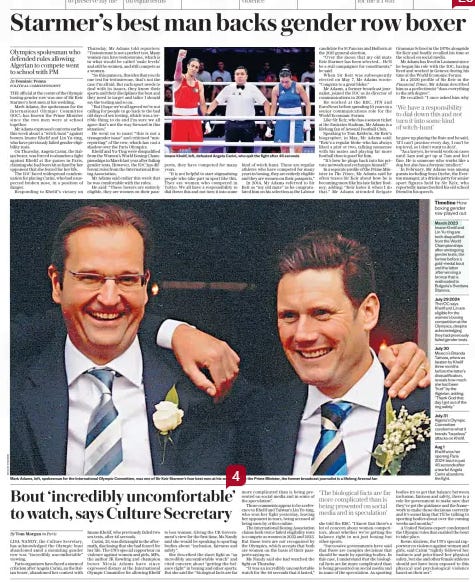
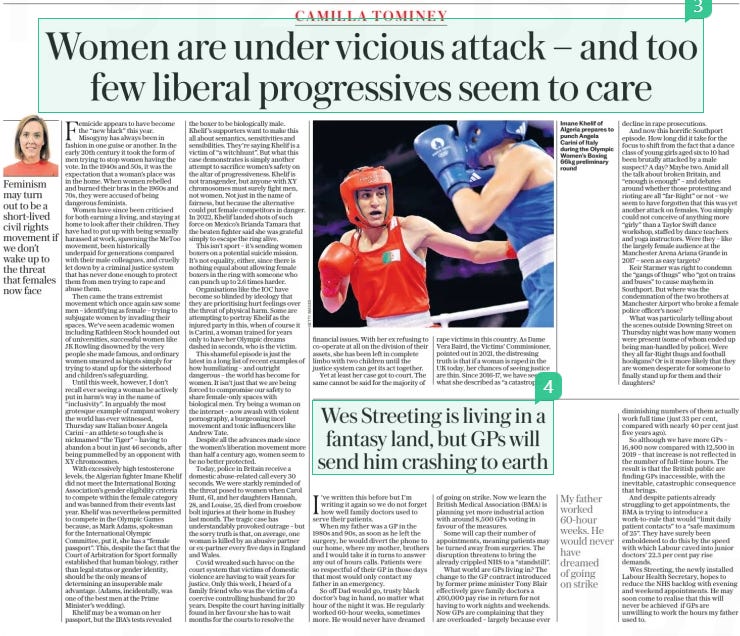

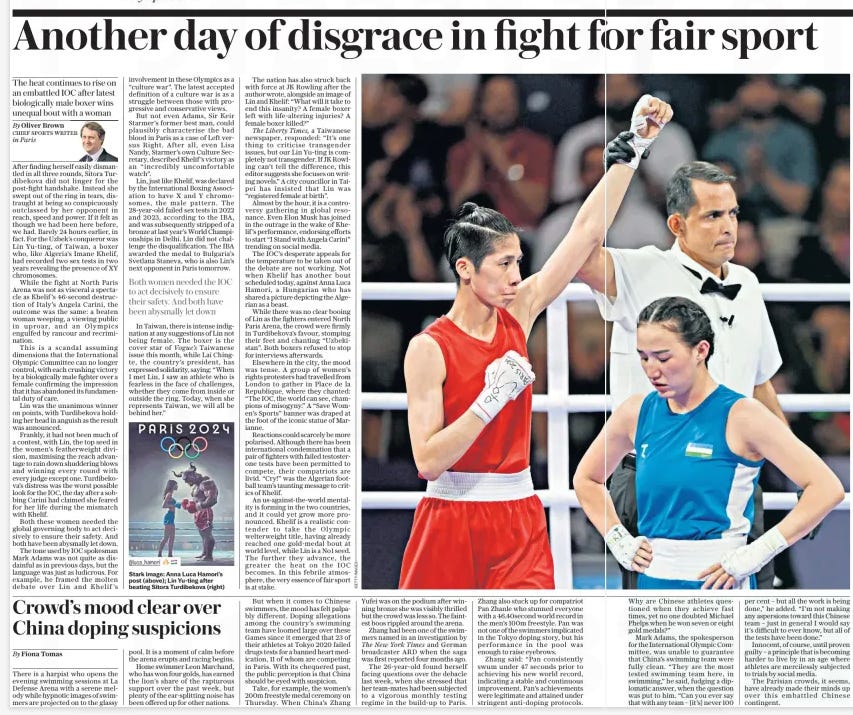
Sunday Total: 12
Observer [2]
![Algerian fighter at centre of gender row sheds tears after quarter-final victory Imane Khelif, who is now guaranteed a medal, met with deafening cheers The Observer4 Aug 2024Alexandra Topping North Paris Arena John Locher/AP ABOVE Algeria’s Imane Khelif celebrates her quarter-final victory yesterday A boxer at the centre of the gender eligibility storm at the Paris Olympics wrote her name on the floor of the ring yesterday, and burst into tears after securing an Olympic medal. Algeria’s Imane Khelif was overwhelmed with emotion and repeatedly slammed the floor of the ring with her hands, having beaten the Hungarian fighter Anna Luca Hamori convincingly in the quarter-final of the 66kg category. After the fight, Hamori congratulated her opponent and wished her luck for the remainder of the competition. Asked about the controversy, she said: “I don’t care.” The 25-year-old Khelif is now guaranteed Algeria’s first boxing medal since 2000, after winning the three-round bout 5-0 by unanimous decision, with the prospect of the gold medal in her sights. She faces Thailand’s Janjaem Suwannapheng in the semi-finals on 6 August. Khelif and the Taiwanese fighter Lin Yu-ting have come under intense scrutiny at these Games. Both fighters competed without incident at Tokyo 2020, but were disqualified from last year’s world championships at a late stage by the International Boxing Association (IBA) for failing to meet its gender eligibility criteria. The International Olympic Committee (IOC) has cast doubts on the tests taken, calling the disqualifications “arbitrary”, while IOC president Thomas Bach said the boxers had been subjected to “hate speech”. In Paris yesterday, Khelif entered the ring to deafening cheers from a large Algerian contingent. She dominated the fight but afterwards was in tears as she walked past a scrum of international journalists. Yacine Arab, the sport manager of the Algerian Olympic Committee, said Khelif had not had her phone with her in the last 24 hours, in a bid to shield her. “This controversy is a joke,” he said. “Everybody knows that Imane was born a girl. She [fought] all her time as a girl, all the competitions she was a girl. When she was losing, nobody talked about this.” Before the fight, the father of the Algerian boxer said criticism of her was “not fair”. Amar Khelif told Reuters: “Having such a daughter is an honour because she is a champion, she honoured me and I encourage her and I hope she will get the medal … Imane is a little girl that has loved sport since she was six years old.” The IBA, led by Umar Kremlev, a Russian national, and funded by the sanctioned company Gazprom, is not running the Olympic boxing competition after it was expelled from the Olympic movement for failing to reform judging and refereeing, and over financial stability and governance issues. Kremlev said of the fighters last year that DNA tests had “proved they had XY chromosomes and were thus excluded”. However, the gender eligibility of the two boxers remains unclear. The IOC criticised the IBA for changing its gender rules in the middle of the 2023 world championships. It has said it is happy for both fighters to compete under the less strict gender eligibility rules, based on their passports that were in place for the Tokyo Games in 2021. The IOC stopped blanket sex testing in 1999. Prior to the fight yesterday, Bach said: “We are not talking about the transgender issue here. This is about a woman taking part in a woman’s category. But I repeat here this is not a DSD case.” The IOC subsequently tweeted that Bach had meant to say that this was not a transgender case. “Differences of sex development” (DSD) describes conditions that occur early in pregnancy in which sex development is not typical. It was previously known as “intersex”. The term transgender refers to people whose current gender identity differs from the sex they were registered with at birth. Before yesterday’s bout, the Hungarian Boxing Association said it had protested to the International Olympic Committee and was investigating the possibility of legally challenging Khelif’s presence at the Games. Speaking after the fight, Hungarian Olympic Committee member Balázs Fürjes was more conciliatory. “As loyal members of the International Olympic family we are 100% convinced that the International Committee will make the right decisions,” he said. Article Name:Algerian fighter at centre of gender row sheds tears after quarter-final victory Publication:The Observer Author:Alexandra Topping North Paris Arena Start Page:9 End Page:9 Algerian fighter at centre of gender row sheds tears after quarter-final victory Imane Khelif, who is now guaranteed a medal, met with deafening cheers The Observer4 Aug 2024Alexandra Topping North Paris Arena John Locher/AP ABOVE Algeria’s Imane Khelif celebrates her quarter-final victory yesterday A boxer at the centre of the gender eligibility storm at the Paris Olympics wrote her name on the floor of the ring yesterday, and burst into tears after securing an Olympic medal. Algeria’s Imane Khelif was overwhelmed with emotion and repeatedly slammed the floor of the ring with her hands, having beaten the Hungarian fighter Anna Luca Hamori convincingly in the quarter-final of the 66kg category. After the fight, Hamori congratulated her opponent and wished her luck for the remainder of the competition. Asked about the controversy, she said: “I don’t care.” The 25-year-old Khelif is now guaranteed Algeria’s first boxing medal since 2000, after winning the three-round bout 5-0 by unanimous decision, with the prospect of the gold medal in her sights. She faces Thailand’s Janjaem Suwannapheng in the semi-finals on 6 August. Khelif and the Taiwanese fighter Lin Yu-ting have come under intense scrutiny at these Games. Both fighters competed without incident at Tokyo 2020, but were disqualified from last year’s world championships at a late stage by the International Boxing Association (IBA) for failing to meet its gender eligibility criteria. The International Olympic Committee (IOC) has cast doubts on the tests taken, calling the disqualifications “arbitrary”, while IOC president Thomas Bach said the boxers had been subjected to “hate speech”. In Paris yesterday, Khelif entered the ring to deafening cheers from a large Algerian contingent. She dominated the fight but afterwards was in tears as she walked past a scrum of international journalists. Yacine Arab, the sport manager of the Algerian Olympic Committee, said Khelif had not had her phone with her in the last 24 hours, in a bid to shield her. “This controversy is a joke,” he said. “Everybody knows that Imane was born a girl. She [fought] all her time as a girl, all the competitions she was a girl. When she was losing, nobody talked about this.” Before the fight, the father of the Algerian boxer said criticism of her was “not fair”. Amar Khelif told Reuters: “Having such a daughter is an honour because she is a champion, she honoured me and I encourage her and I hope she will get the medal … Imane is a little girl that has loved sport since she was six years old.” The IBA, led by Umar Kremlev, a Russian national, and funded by the sanctioned company Gazprom, is not running the Olympic boxing competition after it was expelled from the Olympic movement for failing to reform judging and refereeing, and over financial stability and governance issues. Kremlev said of the fighters last year that DNA tests had “proved they had XY chromosomes and were thus excluded”. However, the gender eligibility of the two boxers remains unclear. The IOC criticised the IBA for changing its gender rules in the middle of the 2023 world championships. It has said it is happy for both fighters to compete under the less strict gender eligibility rules, based on their passports that were in place for the Tokyo Games in 2021. The IOC stopped blanket sex testing in 1999. Prior to the fight yesterday, Bach said: “We are not talking about the transgender issue here. This is about a woman taking part in a woman’s category. But I repeat here this is not a DSD case.” The IOC subsequently tweeted that Bach had meant to say that this was not a transgender case. “Differences of sex development” (DSD) describes conditions that occur early in pregnancy in which sex development is not typical. It was previously known as “intersex”. The term transgender refers to people whose current gender identity differs from the sex they were registered with at birth. Before yesterday’s bout, the Hungarian Boxing Association said it had protested to the International Olympic Committee and was investigating the possibility of legally challenging Khelif’s presence at the Games. Speaking after the fight, Hungarian Olympic Committee member Balázs Fürjes was more conciliatory. “As loyal members of the International Olympic family we are 100% convinced that the International Committee will make the right decisions,” he said. Article Name:Algerian fighter at centre of gender row sheds tears after quarter-final victory Publication:The Observer Author:Alexandra Topping North Paris Arena Start Page:9 End Page:9](https://substackcdn.com/image/fetch/w_1456,c_limit,f_auto,q_auto:good,fl_progressive:steep/https%3A%2F%2Fsubstack-post-media.s3.amazonaws.com%2Fpublic%2Fimages%2Fff35db8c-f36b-42ae-9477-90415008c176_314x663.png)
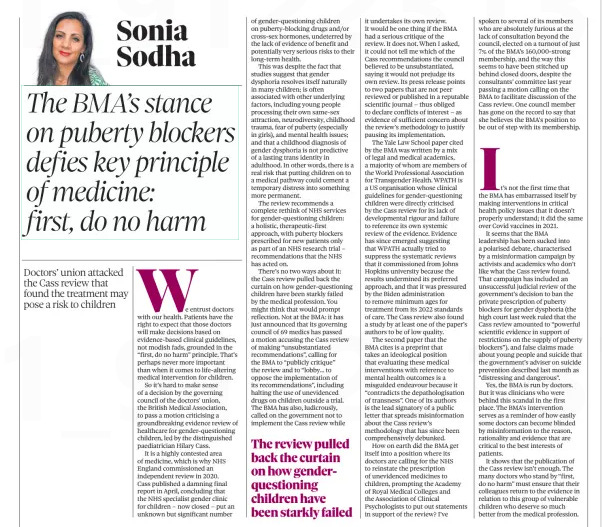
Sunday Times [2]
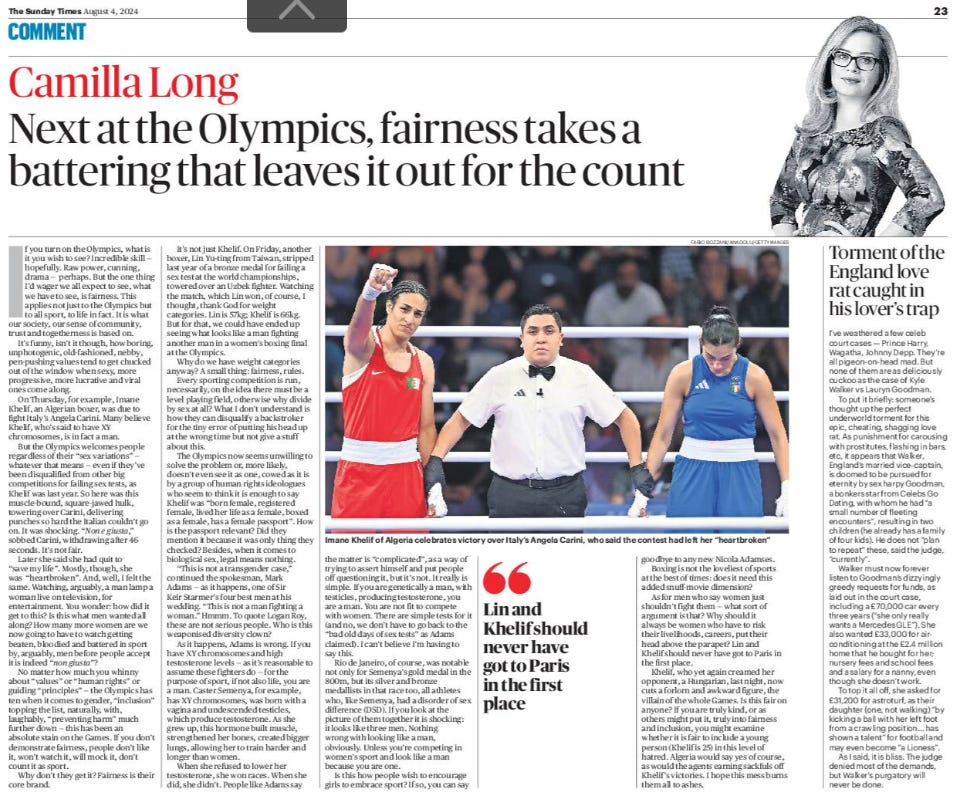
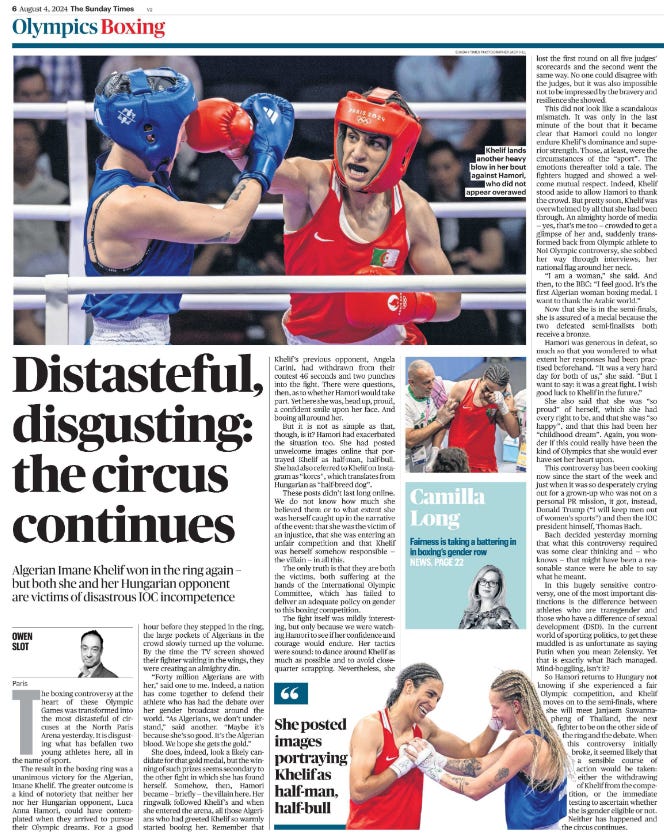
Mail on Sunday [3]
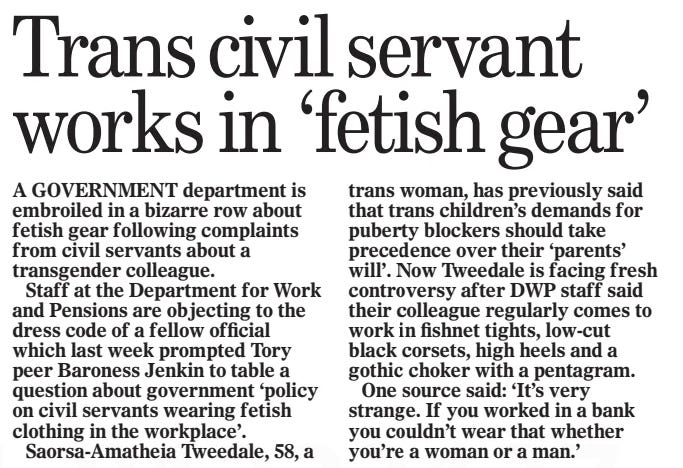
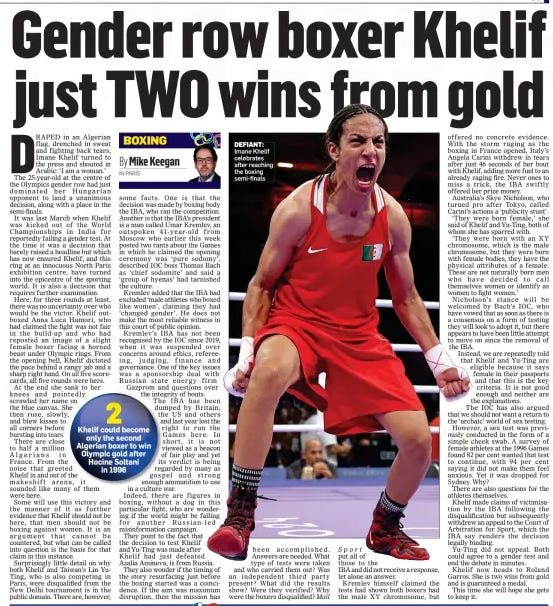
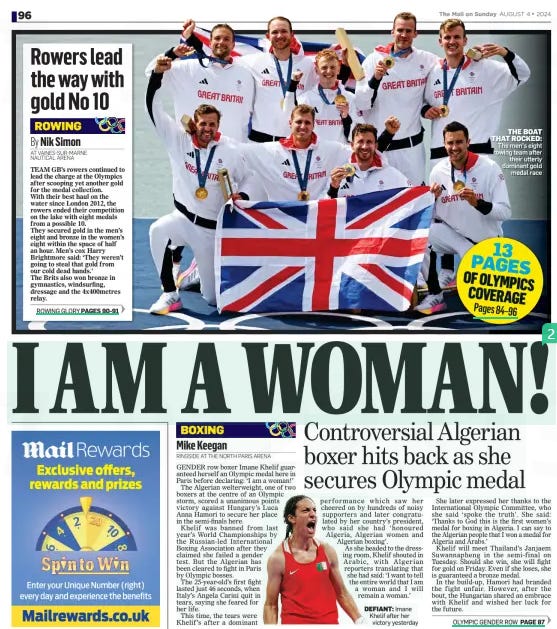
Sunday Telegraph [5]
![The credibility of this Olympics is in peril thanks to boxing’s gender travesty The Sunday Telegraph4 Aug 2024 “I had to preserve myself. After the second [punch], I couldn’t breathe anymore. I never felt a punch like this.” So were the words of the Italian Olympic boxer Angela Carini on her withdrawal after 46 seconds from her now infamous bout with the Algerian Imane Khelif on Thursday in Paris. Khelif, along with fellow boxer Lin Yu-ting of Taiwan, competed at the 2020 Tokyo Olympics without controversy, but were disqualified from the Women’s World Boxing Championships last year for failing to meet gender eligibility criteria. The boxers’ testosterone levels exceeded the limit for the female category, while DNA tests also revealed that each contestant had male XY, not XX chromosomes, according to the International Boxing Association. But the International Olympic Committee (IOC), full to bursting with its “inclusiveness” agenda, takes a different view, one startlingly bereft of biological considerations. Thus we find ourselves at the present grisly pass, with athletes – and there have been more in the boxing since – raised female but with male chromosomes and testosterone levels – known as DSD, for “differences of sexual development” – eligible for women’s competitions in the Olympics. Male testosterone levels dramatically skew any strengthbased contest, but this seems less important to the IOC than its diversity agenda. “Obviously I am not going to comment on individuals,” weaselled the IOC spokesman Mark Adams. “That’s really invidious and unfair. But I would just say that everyone competing in the women’s category is complying with the competition eligibility rules. They are women in their passports and it is stated that is the case.” Come again? What planet are these people on? It is obvious to almost everyone else that gender as stated on passports is a faulty, sloppy measure of biological sex in this day and age, especially for sport of such stakes as this. In fact, sex as stated on passports could soon mean literally nothing at all in countries – like ours – run by governments ever keener on making gender a matter of personal statement. Carini’s heart-rending words cannot be forgotten, though, and they merge with those of the tireless JK Rowling who, as usual, is taking no prisoners. “What will it take to end this insanity?” she posted. “A female boxer left with life-altering injuries? A female boxer killed?” Carini’s dangerous encounter with Khelif suggests this could well be what it takes. On Khelif ’s smile after Carini withdrew, Rowling went further. “Could any picture sum up our new men’s rights movement better? The smirk of a male who knows he’s protected by a misogynist sporting establishment enjoying the distress of a woman he’s just punched in the head, and whose life’s ambition he’s just shattered.” Not all will agree with calling Khelif a man. But Rowling’s fury is understandable. The wild injustice of misogyny pretending to be progress has dragged at women’s sport for the five or so years in which an extreme trans ideology has been in the ascendant. It has exhausted us all as much as it has demoralised and robbed female athletes of their pride and achievements. The rules set by sporting elites have meant that biologically male swimmers like Lia Thomas could compete in America’s National Collegiate Athletics Association; Thomas ended up winning, easily – simply robbing female swimmers of the chance. Trans cyclists were also included in championships before uproar reversed eligibility. And the last Olympics saw Laurel Hubbard, a trans female weightlifter, compete in the games for New Zealand. It was obscene. If the precise gendered condition of Khelif and Lin is complex, the problem that underlies this whole mess is crystal clear: the kings of sport, from the IOC to Fifa, are in their own sinister, self-serving world of woke flim-flammery. The trouble is that when the IOC, Fifa and the Premier League put their wrongheaded ideas into action, it has a profound impact, making something very much not fine appear to be the most decent, normal thing in the world. Should the 2022 World Cup – a huge boon for any country – have been held in Qatar, an autocracy where the rights of women and sexual minorities are in the Stone Age and terror kingpins are given luxurious shelter? Probably not, on moral grounds. But given that it was, perhaps its pusillanimous power-brokers should be less keen on appearing progressive in other areas. There was Gary Lineker commentating in Qatar, condemning its stance on LGBTQ rights while having a lovely old time. Lineker is keen on appearing virtuous but like the rest of them, ends up being awful: insistent on everyone taking the knee in misplaced BLM activist enthusiasm one day; condemning Israel’s response to October 7 with rabid determination another. I don’t imagine Lineker would set foot in Israel, which he deems genocidal – but Qatar? Well, if you insist. Then there’s Algeria’s Olympic ‘What will it take to end this insanity?’ wrote JK Rowling. ‘A female boxer killed?’ committee. Accusing critics of “targeting” Khelif unfairly, one would be forgiven for thinking the Islamic country is some kind of gender-fluid paradise, a place where extremely masculinepresenting woman-identified boxers with potentially intersex chromosomal make-ups are commonplace, rather than a fascinating exception in a regime where homosexuality and cross-dressing are punished with imprisonment, beatings, torture and vigilante executions. Sport at the level we are seeing in Paris is a glorious feat and spectacle. It’s just a shame, a tragedy even, that those tasked with protecting it seem most intent on destroying it. But that seems par for the course in our modern age. Article Name:The credibility of this Olympics is in peril thanks to boxing’s gender travesty Publication:The Sunday Telegraph Start Page:6 End Page:6 The credibility of this Olympics is in peril thanks to boxing’s gender travesty The Sunday Telegraph4 Aug 2024 “I had to preserve myself. After the second [punch], I couldn’t breathe anymore. I never felt a punch like this.” So were the words of the Italian Olympic boxer Angela Carini on her withdrawal after 46 seconds from her now infamous bout with the Algerian Imane Khelif on Thursday in Paris. Khelif, along with fellow boxer Lin Yu-ting of Taiwan, competed at the 2020 Tokyo Olympics without controversy, but were disqualified from the Women’s World Boxing Championships last year for failing to meet gender eligibility criteria. The boxers’ testosterone levels exceeded the limit for the female category, while DNA tests also revealed that each contestant had male XY, not XX chromosomes, according to the International Boxing Association. But the International Olympic Committee (IOC), full to bursting with its “inclusiveness” agenda, takes a different view, one startlingly bereft of biological considerations. Thus we find ourselves at the present grisly pass, with athletes – and there have been more in the boxing since – raised female but with male chromosomes and testosterone levels – known as DSD, for “differences of sexual development” – eligible for women’s competitions in the Olympics. Male testosterone levels dramatically skew any strengthbased contest, but this seems less important to the IOC than its diversity agenda. “Obviously I am not going to comment on individuals,” weaselled the IOC spokesman Mark Adams. “That’s really invidious and unfair. But I would just say that everyone competing in the women’s category is complying with the competition eligibility rules. They are women in their passports and it is stated that is the case.” Come again? What planet are these people on? It is obvious to almost everyone else that gender as stated on passports is a faulty, sloppy measure of biological sex in this day and age, especially for sport of such stakes as this. In fact, sex as stated on passports could soon mean literally nothing at all in countries – like ours – run by governments ever keener on making gender a matter of personal statement. Carini’s heart-rending words cannot be forgotten, though, and they merge with those of the tireless JK Rowling who, as usual, is taking no prisoners. “What will it take to end this insanity?” she posted. “A female boxer left with life-altering injuries? A female boxer killed?” Carini’s dangerous encounter with Khelif suggests this could well be what it takes. On Khelif ’s smile after Carini withdrew, Rowling went further. “Could any picture sum up our new men’s rights movement better? The smirk of a male who knows he’s protected by a misogynist sporting establishment enjoying the distress of a woman he’s just punched in the head, and whose life’s ambition he’s just shattered.” Not all will agree with calling Khelif a man. But Rowling’s fury is understandable. The wild injustice of misogyny pretending to be progress has dragged at women’s sport for the five or so years in which an extreme trans ideology has been in the ascendant. It has exhausted us all as much as it has demoralised and robbed female athletes of their pride and achievements. The rules set by sporting elites have meant that biologically male swimmers like Lia Thomas could compete in America’s National Collegiate Athletics Association; Thomas ended up winning, easily – simply robbing female swimmers of the chance. Trans cyclists were also included in championships before uproar reversed eligibility. And the last Olympics saw Laurel Hubbard, a trans female weightlifter, compete in the games for New Zealand. It was obscene. If the precise gendered condition of Khelif and Lin is complex, the problem that underlies this whole mess is crystal clear: the kings of sport, from the IOC to Fifa, are in their own sinister, self-serving world of woke flim-flammery. The trouble is that when the IOC, Fifa and the Premier League put their wrongheaded ideas into action, it has a profound impact, making something very much not fine appear to be the most decent, normal thing in the world. Should the 2022 World Cup – a huge boon for any country – have been held in Qatar, an autocracy where the rights of women and sexual minorities are in the Stone Age and terror kingpins are given luxurious shelter? Probably not, on moral grounds. But given that it was, perhaps its pusillanimous power-brokers should be less keen on appearing progressive in other areas. There was Gary Lineker commentating in Qatar, condemning its stance on LGBTQ rights while having a lovely old time. Lineker is keen on appearing virtuous but like the rest of them, ends up being awful: insistent on everyone taking the knee in misplaced BLM activist enthusiasm one day; condemning Israel’s response to October 7 with rabid determination another. I don’t imagine Lineker would set foot in Israel, which he deems genocidal – but Qatar? Well, if you insist. Then there’s Algeria’s Olympic ‘What will it take to end this insanity?’ wrote JK Rowling. ‘A female boxer killed?’ committee. Accusing critics of “targeting” Khelif unfairly, one would be forgiven for thinking the Islamic country is some kind of gender-fluid paradise, a place where extremely masculinepresenting woman-identified boxers with potentially intersex chromosomal make-ups are commonplace, rather than a fascinating exception in a regime where homosexuality and cross-dressing are punished with imprisonment, beatings, torture and vigilante executions. Sport at the level we are seeing in Paris is a glorious feat and spectacle. It’s just a shame, a tragedy even, that those tasked with protecting it seem most intent on destroying it. But that seems par for the course in our modern age. Article Name:The credibility of this Olympics is in peril thanks to boxing’s gender travesty Publication:The Sunday Telegraph Start Page:6 End Page:6](https://substackcdn.com/image/fetch/w_1456,c_limit,f_auto,q_auto:good,fl_progressive:steep/https%3A%2F%2Fsubstack-post-media.s3.amazonaws.com%2Fpublic%2Fimages%2F8637bd5e-8a95-4e44-8f24-85121834f120_719x720.png)
